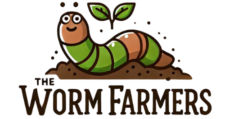Wondering what you can and can’t compost in a worm bin? When it comes to worm composting, not all food scraps are created equal. Feed your worms the right stuff, and they’ll reward you with nutrient-rich compost. Feed them the wrong stuff, and, well…you might end up with a stinky, unhappy bin.
This guide will break down exactly what your worms love, what they tolerate, and what they absolutely hate.

What Worms Love to Eat
These are the all-stars of worm bin feeding. Red wigglers will happily munch away on these scraps, turning them into black gold for your garden:
- Fruits and Vegetables: Apples, bananas, carrots, lettuce, etc.
- Coffee Grounds: Worms love the caffeine buzz (but no filters with synthetic materials).
- Tea Bags: Make sure they’re biodegradable and skip the staples.
- Eggshells: Crushed finely—they add grit and calcium.
- Grains: Small amounts of bread, pasta, or rice (non-oily and unseasoned).
- Shredded Paper: Newspaper and cardboard make great bedding and occasional snacks.
Pro Tip: Chop food into small pieces to make it easier for worms to digest.
What Worms Tolerate (in Moderation)
While worms can eat these items, they can cause issues if overused. Treat these as occasional treats:
- Citrus Peels: Small amounts are fine, but too much acidity can harm your worms.
- Onions and Garlic: The strong smell can linger in the bin.
- Starchy Foods: Potatoes and bread can be hard to break down if added in bulk.
Pro Tip: If in doubt, add sparingly and monitor how your worms react.
What Worms Hate (Do NOT Feed)
Avoid these at all costs. Feeding these items can lead to bad smells, pests, or even harm your worms:
- Meat and Dairy: These attract pests and can rot, creating odors.
- Oily Foods: Worms can’t process grease or oils.
- Salty or Spicy Foods: Harmful to worms’ sensitive skin.
- Non-Biodegradable Materials: Plastic, foil, or coated paper.
- Pet Waste: Contains harmful pathogens.
Pro Tip: If you’re not sure, skip it. Better safe than smelly.

How to Feed Your Worms
- Prepare the Food: Chop scraps into small pieces to speed up decomposition.
- Bury the Scraps: Always bury food under bedding to prevent odors and pests.
- Monitor Feeding: Only add more food when the last batch is mostly gone.
Troubleshooting Feeding Issues
- Overfeeding: Leads to rotting food and smells. Reduce feeding and remove uneaten scraps.
- Pests in the Bin: Make sure all food is buried and avoid adding sugary items.
- Unhappy Worms: Check moisture, temperature, and the type of food you’re feeding.
FAQs About Feeding Worms
Q: How often should I feed my worms?
Once or twice a week, depending on how quickly they’re eating.
Q: Can I compost moldy food?
A little mold is okay, but avoid adding large amounts of spoiled food.
Q: Do I need to pre-compost scraps?
Not necessary, but pre-composting or freezing scraps can speed up decomposition.
Helpful Worm Composting Links
- Learn How to Start Worm Composting.
- Discover Troubleshooting Common Worm Bin Problems.
- Explore 5 Easy Ways to Use Vermicompost in Your Garden.
Final Thoughts On What You Can and Can’t Compost in a Worm Bin
Feeding your worms isn’t complicated once you know what they love (and what they don’t). Stick to these guidelines, and your bin will stay healthy, odor-free, and productive. Remember, happy worms = amazing compost!
Ready to get started? Check out our guide to Best Worm Composting Bins for Beginners and start feeding your worms like a pro today.





